- Home
- Julia Quinn
The Sum of All Kisses Page 8
The Sum of All Kisses Read online
Page 8
“Apparently, she’s quite good.”
“What has that got to do with anything?”
Iris shrugged. “I expect she likes to practice every day. Many great musicians do.”
“I wouldn’t know,” Sarah said.
Iris gave her a commiserating look, then said, “I need to find her before Daisy does. Under no circumstances may she permit Daisy to borrow her cello on my behalf.”
“If she’s that good, she probably wouldn’t want to lend it out. At least not to one of us.” Sarah grimaced. Lady Edith was relatively new to London, but surely she knew of the Smythe-Smith musicale.
“I’m apologizing in advance for abandoning you,” Iris said, keeping her eyes on the open doorway. “I shall probably bolt midsentence the moment I see her.”
“I may have to bolt first,” Sarah told her. “I have been assigned duties of my own for the evening.”
Her tone must have belied her distaste, because Iris turned to her with renewed interest.
“I’m to be nanny to Hugh Prentice,” Sarah said, sounding rather burdened as the words clipped out of her mouth. But it was a good kind of burdened. If she was going to have a dreadful evening, at least she could boast about it in advance.
“Nanny to— Oh, my.”
“Don’t laugh,” Sarah warned.
“I wasn’t going to,” Iris clearly lied.
“Honoria insisted. She thinks he won’t feel welcome if one of us doesn’t see to his happiness and inclusion.”
“And she asked you to nanny him?” Iris gave her a dubious stare, always an unsettling expression. There was something about Iris’s eyes, that watery pale blue and the lashes so fine they were almost invisible. She could be rather unnerving.
“Well, no,” Sarah admitted, “not in so many words.” Not in any words, to be truthful, and in fact, Honoria had specifically denied those words, but it did make for a better story to call herself a nanny.
At functions such as these, one had to have something good about which to complain. It was rather like those boys at Cambridge she’d met last spring. They only seemed happy when they’d been able to moan about how much work they had to do.
“What does she want you to do?” Iris asked.
“Oh, this and that. I’m to sit with him tomorrow at the wedding breakfast. Rupert’s taken ill,” she added as an aside.
“Well, that’s good, at least,” Iris murmured.
Sarah acknowledged this with a brief nod as she continued. “And she specifically asked me to entertain Lord Hugh before supper.”
Iris glanced over her shoulder. “Is he here yet?”
“No,” Sarah said with a happy sigh.
“Don’t get too complacent,” Iris warned. “He’ll be down. If Honoria asked you to watch out for him, she will have asked him—quite specifically—to come to supper.”
Sarah stared at Iris in horror. Honoria had said she wasn’t trying to make a match of the two of them . . . “Surely you don’t think—”
“No, no,” Iris said with a snort, “she wouldn’t dare try to play matchmaker. Not with you.”
Sarah’s lips came together to ask her what she meant by that, but before she could make a sound, Iris added, “You know Honoria. She likes everything to be neat and tidy. If she wants you to look after Lord Hugh, she’ll make sure he’s here to need looking after.”
Sarah considered this for a moment, then gave a nod of concurrence. Honoria was like that. “Well,” she declared, because she always did like a declarative well. “It’s going to make for a miserable two days, but I promised Honoria, and I always keep my obligations.”
If Iris had been sipping a drink, she would have sprayed it across the room. “You?”
“What do you mean, me?” Sarah demanded. Iris looked as if she was about to chortle with amusement.
“Oh, please,” Iris said, in that scornful way one could adopt only with family and still hope to be on speaking terms the next day, “you are the last person who can claim to keep all of her obligations.”
Sarah drew back, deeply affronted. “I beg your pardon.”
But if Iris saw Sarah’s distress, she did not notice. Or did not care. “Does your memory not stretch back to last April?” Iris prompted. “April the fourteenth, to be precise?”
The musicale. Sarah had backed out the afternoon of the performance. “I was ill,” she protested. “There was no way I could have played.”
Iris did not say a word. She didn’t have to. Sarah was lying, and they both knew it.
“Very well, I wasn’t ill,” Sarah admitted. “At least not very ill.”
“It’s nice of you to finally admit it,” Iris said in an annoyingly superior voice.
Sarah shifted her weight uncomfortably. It had been the two of them that spring, plus Honoria and Daisy. Honoria had been happy to play as long as she was with family, and Daisy was convinced that she was well on her way to becoming a virtuoso. Iris and Sarah, on the other hand, had held many conversations debating the various methods of death by musical instrument. Gallows humor. It had been the only way they’d been able to get through the dread.
“I did it for you,” she finally said to Iris.
“Oh, really.”
“I thought the entire performance would be canceled.”
Iris was clearly unconvinced.
“I did!” Sarah insisted. “Who would have ever thought Mama would drag poor Miss Wynter into the performance? Although it did turn out well for her, didn’t it?”
Miss Wynter—Miss Anne Wynter, who was going to marry Cousin Daniel in two weeks and become the Countess of Winstead—had made the mistake of once telling Sarah’s mother that she could play the pianoforte. Lady Pleinsworth, apparently, had not forgotten this.
“Daniel would have fallen in love with Miss Wynter regardless,” Iris retorted, “so don’t try to soothe your conscience with that.”
“I wasn’t. I was merely pointing out that I never could have foreseen—” She let out an impatient breath. None of this sounded the way it did in her head. “Iris, you must know that I was trying to save you.”
“You were trying to save yourself.”
“I was trying to save both of us. It just— It did not work the way I planned.”
Iris regarded her coolly. Sarah waited for her to respond, but she didn’t. She just stood there, drawing out the moment like soft treacle candy, stretched into a ropy swing. Finally, Sarah could take it no more, and she gave in with, “Just say it.”
Iris raised a brow.
“Whatever it is you’re so keen to tell me. Obviously there is something.”
Iris’s lips parted, then closed, as if she were taking time to choose the correct words. Finally, she said, “You know that I love you.”
It was not what Sarah had expected. Unfortunately, neither was what came next.
“I will always love you,” Iris continued. “In fact, I will probably even always like you, and you know I cannot say that about most of our family. But you can be terribly selfish. And the worst part of it is, you don’t even see it.”
It was the strangest thing, Sarah thought. She wanted to say something. She needed to say something, because that’s what she did when faced with something she didn’t like. Iris couldn’t call her selfish and expect Sarah to just stand there and listen.
And yet that was what she seemed to be doing.
She swallowed, and she felt her tongue dart out to moisten her lips, but she could not form words. All she could do was think No. It wasn’t true. She loved her family. She would do anything for them. That Iris could stand there and call her selfish . . .
It cut deep.
Sarah stared at her cousin’s face, sensing the precise moment when Iris moved on, when the fact that she’d just called Sarah selfish was no longer the most consequential thing in the world.
As if anything could be more consequential.
“There she is,” Iris said briskly. “Lady Edith. I need to get to her before D
aisy does.” She took a step, then turned and said, “We can talk about this later. If you want.”
“I’d rather not, thank you,” Sarah replied tightly, finally hauling her personality out of whatever hole it had just jumped into. But Iris didn’t hear her. She’d already turned her back and was making her way toward Lady Edith. Sarah was left alone in the corner, as awkward as a jilted bride.
And that—of course—was when Hugh Prentice arrived.
Chapter Six
The strange thing was, Sarah thought she was angry.
She thought she was furious with Iris, who ought to have been more sensitive to the feelings of others. If Iris had felt the need to call her selfish, at the very least she could have done so in a more private setting.
And then to abandon her! Sarah did understand the need to intercept Lady Edith before Daisy descended upon her, but still, Iris should have said she was sorry.
But then, as Sarah stood in her corner, wondering how long she could pretend that she had not noticed Lord Hugh’s arrival, she took an unexpected breath.
And choked back a sob.
Apparently she was something other than angry, and she was in grave danger of crying, right here in the crowded Fensmore drawing room.
She turned swiftly, determined to examine the large, gloomy portrait that had been keeping her company. The subject appeared to be an unpleasant gentleman from Flanders, seventeenth century, if Sarah’s eye for fashion was correct. How he managed to look so proud in that ridiculous pleated collar she would never know, but he was staring down his beaky nose in a manner that told her clearly that none of his cousins would dare to call him selfish to his face, and if they did, he would not cry about it.
Sarah curled her lip and glared at him. It was probably a testament to the skill of the artist that he seemed to glare right back at her.
“Has the gentleman done something to offend?”
It was Hugh Prentice. Sarah knew his voice well enough by now. Honoria must have sent him over. She could not imagine why he might seek out her company otherwise.
They had promised to be civil, not eager.
She turned. He was standing about two feet from her, impeccably dressed for supper. Except for his cane. It was scuffed and scratched, the wood grain dull from overuse. Sarah wasn’t sure why she found this so interesting. Surely Lord Hugh traveled with a valet. His boots had been buffed to a high shine, and his cravat was expertly tied. Why would his cane be denied the same careful treatment?
“Lord Hugh,” she said, relieved that her voice sounded almost normal as she offered a small curtsy.
He didn’t say anything right away. He turned back to the portrait, his chin tilted up as his eyes swept over it. Sarah was glad he was not looking at her with such examination; she was not sure she could manage another dissection of her faults so soon after the first.
“That collar looks most uncomfortable,” Lord Hugh said.
“That was my first thought as well,” Sarah replied, before she remembered that she did not like him, and more to the point, he was her burden for the evening.
“I expect we should be glad that we live in modern times.”
She did not respond; it was not the sort of statement that required it. Lord Hugh continued to scrutinize the painting, at one point leaning in, presumably to examine the brushwork. Sarah did not know if he’d realized she needed time to compose herself. She could not imagine that he had; he didn’t seem the type of man to notice such things. Either way, she was grateful. By the time he turned to face her, the choking feeling in her chest had eased, and she was no longer in danger of embarrassing herself in front of several dozen of her cousin’s most important wedding guests.
“The wine is very good tonight, I’m told,” she said. It was an abrupt start to conversation, but it was polite and innocuous, and most importantly, it was the first thing that had popped into her head.
“You’re told?” Lord Hugh echoed.
“I haven’t had any myself,” Sarah explained. An awkward pause, and then: “Actually, no one told me. But Lord Chatteris is renowned for his cellars. I cannot imagine the wine would be anything but good.”
Good heavens, this was a stilted conversation. But no matter; Sarah would soldier on. She would not shirk her duties tonight. If Honoria looked her way; if Iris looked her way—
No one would be able to say that she had not kept her promises.
“I try not to drink in the company of the Smythe-Smiths,” Lord Hugh said, almost offhandedly. “It rarely ends well for me.”
Sarah gasped.
“I jest,” he said.
“Of course,” she replied quickly, mortified to have been revealed as so unsophisticated. She should have got the joke. She would have done, if she weren’t still so upset about Iris.
Dear Lord, she said to herself (and Anyone Else who might be listening), please bring this evening to an end with uncanny speed.
“Isn’t it interesting,” Lord Hugh asked slowly, “all that is wrought by societal convention?”
Sarah turned to him, even though she knew she’d never be able to discern his meaning from his expression. He tilted his head to the side, the movement rearranging the shadows on his impassive face.
He was handsome, Sarah realized in a strange burst of awareness. It wasn’t just the color of his eyes. It was the way he looked at a person, unwavering and sometimes unnerving. It lent him an air of intensity that was difficult to ignore. And his mouth—he rarely smiled, or at least he rarely smiled at her, but there was something rather wry about it. She supposed some people might not find that attractive, but she . . .
Did.
Dear Lord, she tried again, forget uncanny. Nothing less than the supernatural would be speedy enough.
“Here we are,” he continued, motioning elegantly with his hand to the rest of the guests, “trapped in a room with, oh, how many others would you say?”
She had no idea where he was going with this, but she hazarded a guess. “Forty?”
“Indeed,” he replied, although she could tell by the quick sweep of his eyes across the room that he disagreed with her estimation. “And their collective presence means that you”—he leaned in, just an inch—“whom we have already established finds me loathsome, are being quite polite.”
“I’m not being polite because there are forty other people in the room,” she said, her brows arching. “I’m being polite because my cousin requested it of me.”
The corner of his mouth moved. It might have been amusement. “Did she realize what a challenge this might pose?”
“She did not,” Sarah said tightly. Honoria knew that Sarah did not care for Lord Hugh’s company, but she did not seem to comprehend the extent of her distaste.
“I must commend you, then,” he said with a wry nod, “for keeping your protestations to yourself.”
Something lovely and familiar clicked back into place, and Sarah finally began to feel more like herself. Her chin rose a very proud half of an inch. “I did not.”
To her great surprise, Lord Hugh made a noise that might have been a smothered laugh. “And she saddled you with me, anyway.”
“She worries that you might not feel welcome here at Fensmore,” Sarah said, in just the sort of tone that said this was not a shared concern.
His brows rose, and again he almost smiled. “And she thinks you are the person to welcome me?”
“I never told her of our previous meeting,” Sarah admitted.
“Ah.” He gave a condescending nod. “It all begins to make sense.”
Sarah clenched her teeth in a largely unsuccessful attempt to keep from snorting. How she hated that tone of voice. That oh-I-see-how-your-pretty-little-female-mind-works tone of voice. Hugh Prentice was hardly the only man in England to employ it, but he seemed to have honed the skill to a razor-fine edge. Sarah could not imagine how anyone tolerated his company for more than a few minutes. Yes, he was rather nice to look at, and yes, he was (she was told) exceptional
ly intelligent, but by God, the man was like fingernails on slate.
She leaned forward. “It is a testament to my love for my cousin that I have not found some way to poison your tooth powder.”
He leaned forward. “The wine might have been an effective substitute,” he said, “were I drinking. That was why you suggested it, was it not?”
She refused to give ground. “You are mad.”
He gave a one-shouldered shrug and backed away as if the charged moment between them had never occurred. “I’m not the one who brought up poison.”
Her mouth fell open. His tone was precisely the one she might use while discussing the weather.
“Angry?” he murmured politely.
Not so much angry as baffled. “You make it very difficult to be nice to you,” she told him.
He blinked. “Was I meant to offer you my tooth powder?”
Good heavens, he was frustrating. And the worst part was, she wasn’t even sure if he was joking now. Nevertheless, she cleared her throat and said, “You were meant to have a normal conversation.”
“I’m not sure the two of us have normal conversations.”
“I can assure you, I do.”
“Not with me.” This time he did smile. She was sure of it.
Sarah straightened her shoulders. Surely the butler must be calling them in to supper soon. Perhaps she ought to start offering her prayers to him, since the other Him didn’t seem to be listening.
“Oh, come now, Lady Sarah,” Lord Hugh said. “You must admit that our first meeting was anything but normal.”
She pressed her lips together. She hated to acknowledge his point—any of his points, really—but he did have one.
“And since then,” he added, “we have met but a handful of times, and always in a most superficial manner.”
“I had not noticed,” she said tightly.
“That it was superficial?”
“That we had met,” she lied.
“Regardless,” he continued, “this is only the second time we have exchanged more than two sentences with each other. The first I believe you instructed me to remove the world of my presence.”

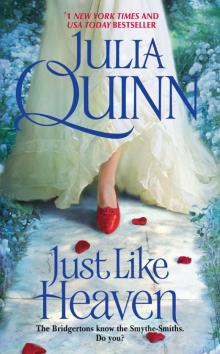 Just Like Heaven
Just Like Heaven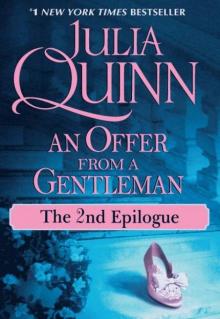 B03.2 An Offer from a Gentleman Ep II
B03.2 An Offer from a Gentleman Ep II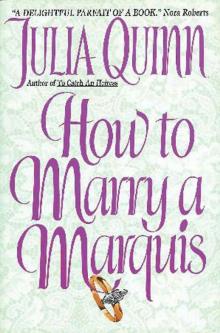 How to Marry a Marquis
How to Marry a Marquis When He Was Wicked: The 2nd Epilogue
When He Was Wicked: The 2nd Epilogue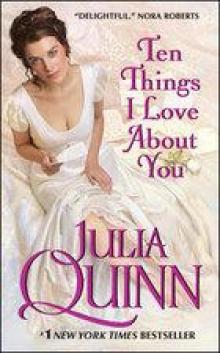 Ten Things I Love About You
Ten Things I Love About You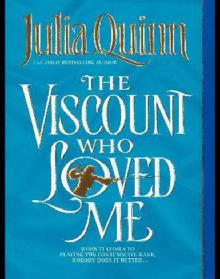 The Viscount Who Loved Me
The Viscount Who Loved Me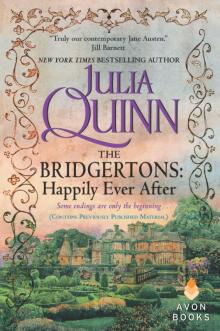 The Duke and I
The Duke and I B05.2 To Sir Philip With Love Ep II
B05.2 To Sir Philip With Love Ep II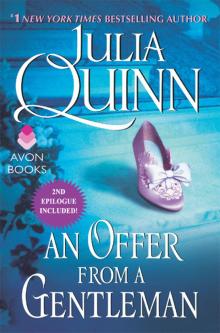 An Offer From a Gentleman: The 2nd Epilogue
An Offer From a Gentleman: The 2nd Epilogue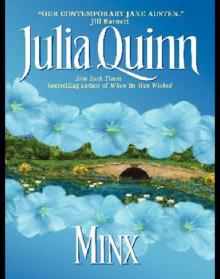 Minx
Minx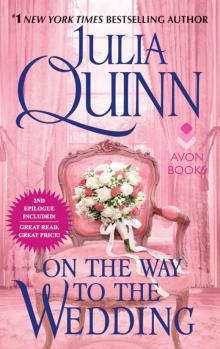 On the Way to the Wedding with 2nd Epilogue
On the Way to the Wedding with 2nd Epilogue Mr. Cavendish, I Presume
Mr. Cavendish, I Presume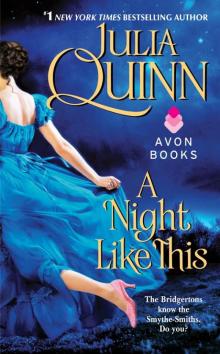 A Night Like This
A Night Like This Splendid
Splendid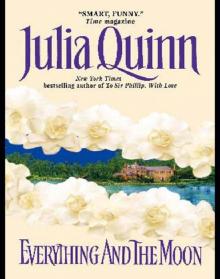 Everything and the Moon
Everything and the Moon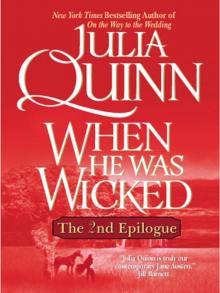 When He Was Wicked
When He Was Wicked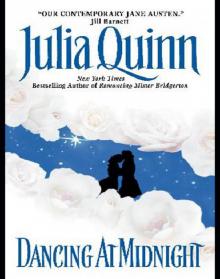 Dancing at Midnight
Dancing at Midnight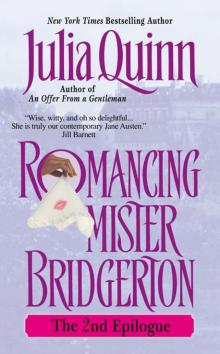 Bridgerton 04: 2nd Epilogue - Romancing Mister Bridgerton
Bridgerton 04: 2nd Epilogue - Romancing Mister Bridgerton The Lost Duke of Wyndham
The Lost Duke of Wyndham To Sir Phillip, With Love
To Sir Phillip, With Love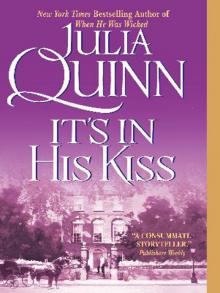 It's in His Kiss
It's in His Kiss The Other Miss Bridgerton
The Other Miss Bridgerton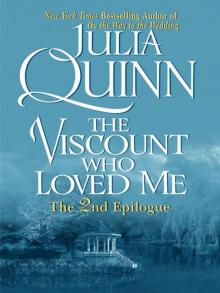 Bridgerton 02: 2nd Epilogue - The Viscount Who Loved Me
Bridgerton 02: 2nd Epilogue - The Viscount Who Loved Me The Secrets of Sir Richard Kenworthy
The Secrets of Sir Richard Kenworthy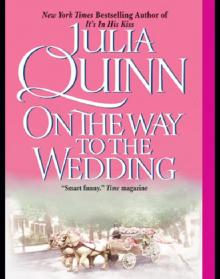 On the Way to the Wedding
On the Way to the Wedding The Secret Diaries of Miss Miranda Cheever
The Secret Diaries of Miss Miranda Cheever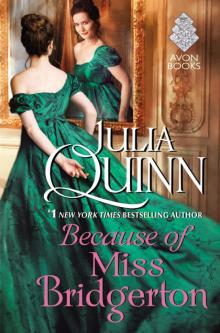 Because of Miss Bridgerton
Because of Miss Bridgerton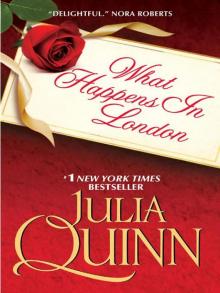 What Happens in London
What Happens in London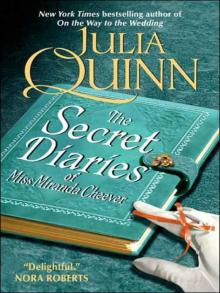 JQuinn - The Secret Diaries of Miss Miranda Cheever
JQuinn - The Secret Diaries of Miss Miranda Cheever The Girl With the Make-Believe Husband
The Girl With the Make-Believe Husband First Comes Scandal
First Comes Scandal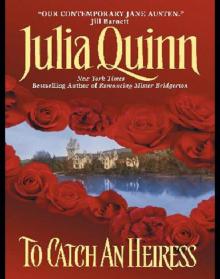 To Catch an Heiress
To Catch an Heiress The Sum of All Kisses
The Sum of All Kisses An Offer From a Gentleman
An Offer From a Gentleman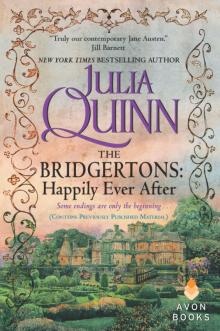 The Bridgertons: Happily Ever After
The Bridgertons: Happily Ever After Bridgerton Collection Volume 1 (Bridgertons)
Bridgerton Collection Volume 1 (Bridgertons)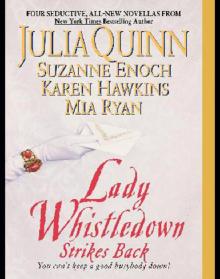 Lady Whistledown Strikes Back
Lady Whistledown Strikes Back Secret Diaries of Miss Miranda Cheever
Secret Diaries of Miss Miranda Cheever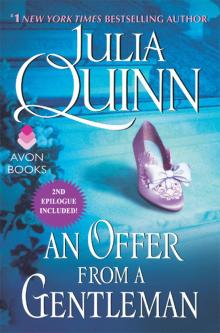 An Offer from a Gentleman with 2nd Epilogue
An Offer from a Gentleman with 2nd Epilogue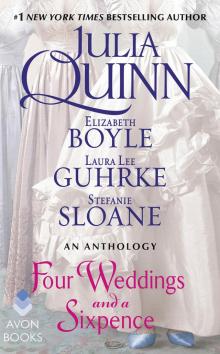 Four Weddings and a Sixpence
Four Weddings and a Sixpence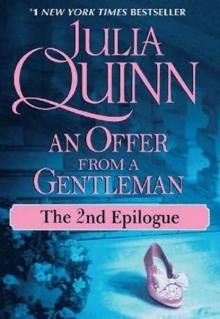 An Offer from a Gentleman: The Epilogue II
An Offer from a Gentleman: The Epilogue II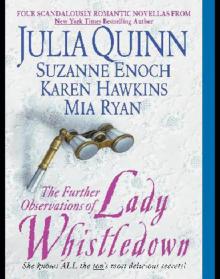 The Further Observations of Lady Whistledown
The Further Observations of Lady Whistledown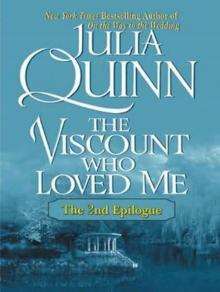 The Viscount Who Loved Me: The Epilogue II
The Viscount Who Loved Me: The Epilogue II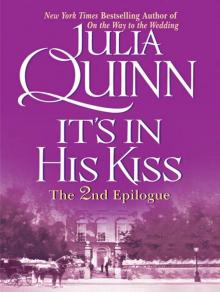 It’s In His Kiss Epilogue II
It’s In His Kiss Epilogue II To Sir Phillip, with Love: The Epilogue II
To Sir Phillip, with Love: The Epilogue II The Secret Diaries of Miss Miranda Cheevers
The Secret Diaries of Miss Miranda Cheevers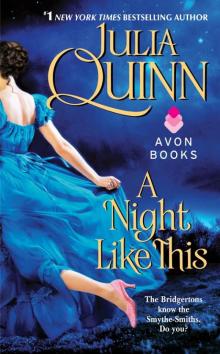 A Night Like This (Smythe-Smith Quartet)
A Night Like This (Smythe-Smith Quartet)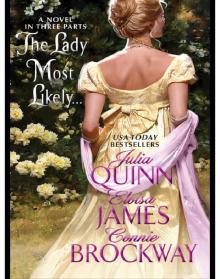 The Lady Most Likely...
The Lady Most Likely...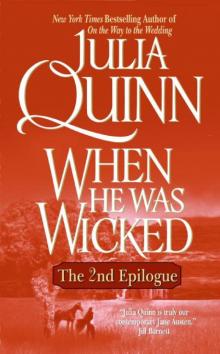 Bridgerton 06: 2nd Epilogue - When He Was Wicked
Bridgerton 06: 2nd Epilogue - When He Was Wicked Just Like Heaven sq-1
Just Like Heaven sq-1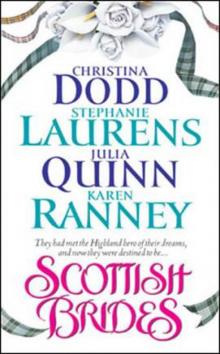 Gretna Greene
Gretna Greene